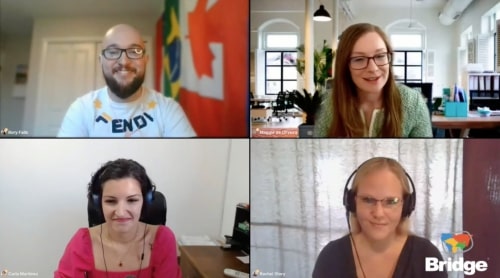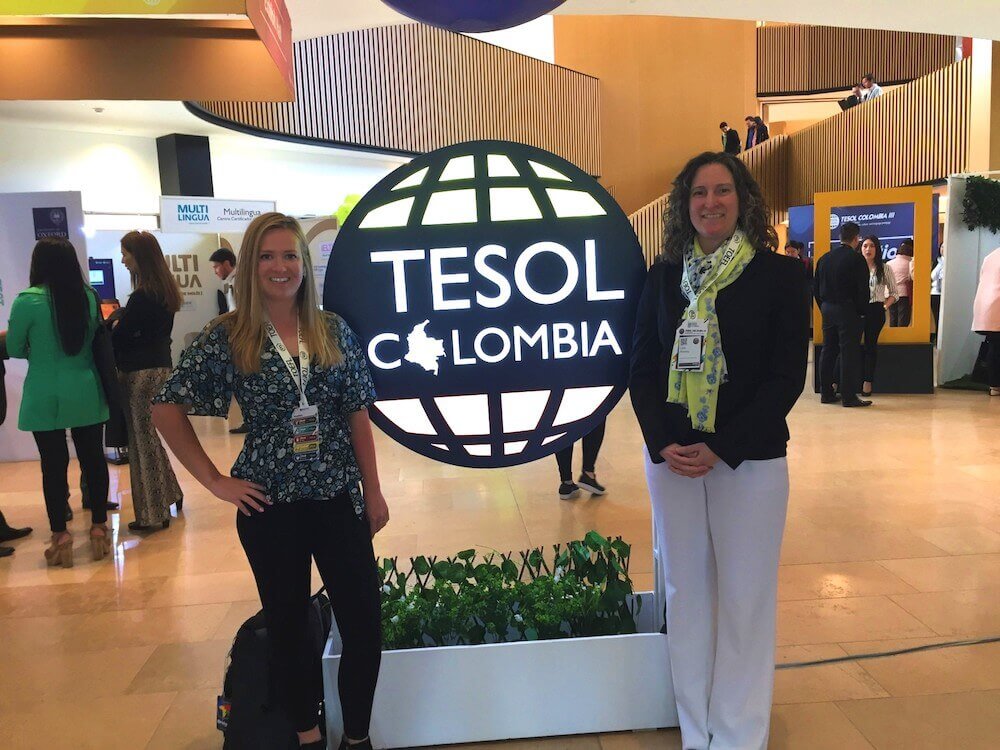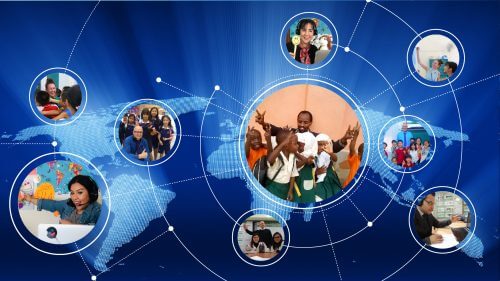Since ELT is a global industry, it’s common for teachers to travel the world and teach in various contexts. However, despite forming part of a global industry, English teachers often struggle to connect with one another to share experiences, challenges and successes. Teachers frequently express the feeling of existing on islands.
Claudia María Uribe, Treasurer of the non-profit professional organization ASOCOPI (Ascociación Colombiana de Profesores de Inglés) of Colombia, South America, says “The idea of our association is to get all teachers of English in Colombia together to feel that they belong.”
English language teacher associations act as a buoy for stranded teachers, guiding them safely back to the shore of like-minded individuals.
English language teacher associations take on many forms, from massive international associations like TESOL and IATEFL to country associations like the English Language Teachers’ Association of Montenegro (ELTAM), with fewer than 300 members but with a mighty purpose nonetheless.
We interviewed over a dozen ELT associations, representing the Americas, Europe, Africa and Asia. Conversations with association representatives primarily explored the association’s role in maintaining standards for the teaching of English in their respective corners of the world, as well as current and upcoming professional development (PD) offerings for their members.
This article will examine how ELT associations around the world took advantage of the pandemic’s silver lining – newfound global connectivity – and how English teachers everywhere can continue to reap the benefits of associations’ innovation during an unprecedented time.
The role of ELT associations
Uniting teachers under a common cause – the shared fervor of learning and teaching English – associations foster community and facilitate the interconnectedness that one would expect in a global industry.
ELT associations play a vital role in policy development and advocate on behalf of language learners in their respective communities. They serve as a nexus, connecting stakeholders (such as community organizations, policy-makers and families) and spearheading advocacy efforts that lead to increased equity and efficacy in the education of English learners.
Of course, ELT associations also deserve recognition for their role in teacher development, which usually extends beyond annual conferences, events that are most likely to draw attention from the press. In fact, ELT associations often serve as an important source of continuing professional development (CPD) in many contexts.
Jelena Spasić, the International Coordinator of ELTA Serbia, explains the system for ongoing professional learning in Serbia, which mandates that teachers collect twenty points of professional development every three years, and how ELTA Serbia supports teachers in meeting that goal with their seminar offerings, accredited by the Ministry of Education. “In 2023 we are going to have a seminar based on the competencies for the use of the Common European Framework, and another one about enhancing and developing the thinking skills of students through teaching foreign languages,” Spasić shared.
Kaithie Ramírez-Correa, Vice President of ASOCOPI, says with regard to PD offerings: “We are trying to listen to the voices of all those rural teachers, elementary teachers or public school teachers that in Colombia are often forgotten.” Their recently-developed Certificate Course on Academic Writing is set to begin in February 2023.
Weathering the storm: supporting teachers through a global pandemic
Teachers in city centers, outskirts and rural areas alike all felt the sting of the transition to online learning. Though governing entities within districts and school administration tried to support their teachers in the transition, local and regional associations proved the real MVPs. Instead of cowering at the challenge, teacher associations stepped up to support teachers in ways that administrations couldn’t, pivoting to address members’ needs at the start of the pandemic.
Some ELT associations felt pressure to become overnight authorities to best serve their constituents.
Spasić of ELTA Serbia reflects back on the moment when the pandemic broke out and schools in Serbia were forced to close down and move instruction online. “We had managed to organize, I think it was within two or three weeks, the first training for the teachers who wanted to use the Zoom platform for their online classes.” One of Spasić’s colleagues, an ELTA member, gave a free workshop explaining how Zoom works and key features to use in instruction.
“Digitalization has come to stay, and helping teachers to acquire the skills to use with their learners is our prime objective.”
This first offering attracted a lot of attention, so much so that Zoom crashed. “We basically had to close down the application process because it exceeded 500 applicants,” she recalls. They repeated this training several times to accommodate members who couldn’t join the first session.
Ita Ndifon, President of CAMELTA (Cameroon English and Literature Teachers’ Association), shares that their support of teachers began with community reflection. “It started with members sharing how the pandemic was lived in their different schools,” he says. From there, support extended to teachers who were helping learners who still had to prepare for public exams.
Once the more pressing issues were covered, training became more focused on developing virtual teaching competencies. “Digitalization has come to stay, and helping teachers to acquire the skills to use with their learners is our prime objective,” states Ndifon, citing both in-person and online training sessions as avenues of support for teachers.
Rob Dickey, former President (2001-2002) of KOTESOL (Korea TESOL) and current Sponsorship Committee Chair, states that the KOTESOL Facebook group was an “early savior.” At the start of the pandemic, KOTESOL members created a special group on Facebook that focused on learning Zoom. Separate from the main group, which has close to 4,000 members, the Zoom-specific group “grew to more than 550 members across the globe, and has been cited in books by folks not in Korea,” Dickey shares. Access to social media groups and resources shared therewithin is not limited to members.

Alan Goh, Head of Business Development for RELC (Regional Language Centre), located in Singapore, says the organization “rushed into creating many types of training for lecturers to provide online learning, including online training and self-help guides.” RELC is a project supported by the Southeast Asian Ministers of Education Organization (SEAMO), which is “dedicated to the development of language education in the region and promotes international cooperation among language professionals” (RELC website).
Throughout the course of the pandemic, RELC implemented e-learning platforms for all of their courses, some of which are entirely online and open to the greater ELT community. “While some lecturers already had competencies in online or remote teaching in some areas – live streaming, facilitating discussions in a digital platform and providing assessment and receiving feedback – much background preparation still had to be done to get academic staff, students and infrastructure ready for lessons to transition seamlessly into online learning,” says Goh.
Leila Afkhami, Founder of Teach for Iran, an organization that provides teacher development in Iran and in neighboring countries, recalls having to start from scratch. “I had a lot of sessions about how to teach online,” she says. “Believe me, nobody even knew what Google Jamboard was.”
The work didn’t end once teachers were “online.” Astute ELT leaders recognized that transitioning teachers to the virtual space wouldn’t be enough – there needed to be ongoing support.
”Even now, three years after recording those classes, they are still being used in the classroom…”
Afkhami talks about how her organization created a Telegram channel called “Teachers Support” as a communication hub for English teachers in Iran and beyond. More than 1,500 members have access to resources covering a variety of topics, including classroom management, positive discipline and choice theory, action research, teacher burnout and more. “Every day, we post and teachers discuss with each other,” Afkhami says. She reiterates that it’s not just Iranian teachers in the group – anyone can join this space.
Ramírez-Correa of ASOCOPI remembers how they were forced to open spaces online. “It was the first decision we made, to offer weekly webinars,” citing the decision as ambitious but necessary. At the end of the year, they decided to offer webinars on a monthly basis, continuing their support but being realistic about their bandwidth. ASOCOPI webinars are archived and accessible to non-members as well.
Other ELT associations we spoke to felt up to the task – in many ways, the pandemic simply fast-tracked changes for which the foundation had already been laid.
Sarah Sahr, Head of Education and Events at TESOL International Association, says, “Being a global association, so much of our member benefit was already online pre-pandemic. Our communities of practice have always been online global communities where members are able to communicate with each other through virtual conversations and discussion boards.” Sahr lists webinars, self-study options, online courses and certificate and leadership programs that already existed pre-pandemic. ”We were already looking at how to put more of our conferences online,” she adds.
Regardless of how “ready” they felt, support from ELT associations proved instrumental in easing the transition to online learning, and governments acknowledged that they couldn’t do it alone.
ELTAM was asked by the country’s Ministry of Education to create and make available not only English lessons but lessons for all subject areas.
ELTAM board member Marija Bojic says ELTAM members “created presentations and filmed video lessons for all the children in the country that were published online and on TV.” Since their initial release, the Ministry of Education has created a website to house the lessons.
This massive task continues to pay off. When schools in Montenegro were evacuated due to a bomb threat, everyone was suddenly back online for a number of days. Dragana Radoman, President of ELTAM, says that she received a number of appreciation emails for the work the association did. She says, “Even now, three years after recording those classes, they are still being used in the classroom and sent to kids as an option. If you are not in a classroom, you have an online lesson that you can watch and do the tasks.”

The rise (and reign) of virtual offerings
While the overwhelming majority of ELT association representatives echo the sentiment that they’re happy to “be out of the woods,” most also acknowledged the silver lining: The pandemic forced professional organizations to think outside the box in terms of their offerings.
Karen Terrell, Board Member-at-Large for GATESOL (Georgia, USA) shares her appreciation of how the pandemic “made these institutions who are used to running on a more traditional track think more creatively.”
Though the learning curve tested the open-mindedness and patience of ELT leaders, many reported feeling proud of what they were able to accomplish in unprecedented times.
Terrell talks about how GATESOL launched a professional learning series last year via Zoom. “They were unsure about how that was going to work out, and it turned out to be the best thing ever. Actually, it even boosted membership,” she says. Terrell shares that GATESOL’s online events, including one about the language of self-advocacy, taking place mid-April, could undoubtedly serve a wider audience.
The emergence of hybrid conferences
Several associations saw their newly acquired tech skills as a way to leverage current in-person offerings, supplementing “crown jewel” events – like annual conferences – through a hybrid approach.
Drew Fagan, Maryland TESOL President, says that “prior to 2020, the annual conference was always in person. This notion of a virtual component didn’t even come to mind.” But, after witnessing the success of an entirely virtual conference in 2021, Fagan doesn’t see the association “ever going back to 100% in-person programming in the future.”
Fagan shares that people who never came to any of the other conferences made it to the events with a hybrid component. He adds, “The notion of hybridity really opens up the possibility of having people statewide and beyond come together.”
Maryland TESOL’s most recent conference, titled “Interlacing the Local and the Global,” modeled what interconnectivity means. Derya Kulavuz-Onal, Vice President of Maryland TESOL, says, “We wanted the conference to be a space for reflection of all those things that are happening globally. Our students learn English and then go out of our classrooms, so what we teach to them has an impact at the global level. So, to reflect that, we had to do a hybrid conference.”
Kulavuz-Onal says that having a hybrid approach allowed people to connect from other parts of the United States, as well as other countries like Korea, Japan, China and Turkey. She, like many other ELT leaders, believes that hybridity supports PD that is “more inclusive and accessible.”
“The notion of hybridity really opens up the possibility of having people statewide and beyond come together.”
Maryland TESOL’s annual conference is scheduled for November 11, 2023 and will offer in-person concurrent sessions and a number of pre-recorded presentations.
TESOL International Association proved a great role model for other associations in the way they handled the evolution of the PD landscape. In 2022, they experimented with a hybrid event, with the in-person and virtual components happening simultaneously.
Amber Kelleher, TESOL’s Executive Director, says of the annual convention, “We tried something in 2022, we made some tweaks, and we’re trying a different approach for 2023.”
This year, there will essentially be two separate conferences, one in person in Portland from March 21-24, and one online on TESOL’s learning management system on April 3-4. Kelleher says attendees can expect both live and pre-recorded content for the virtual convention, and for all the content to be different between the two events.
GATESOL also got creative with structuring their annual conference. Terrell shares that the last annual conference was held in person over the course of three days, each day in a different city in Georgia. Going forward, she says they’re not going to do three because it proved taxing for the board, but that they will split the conference between two locations for the upcoming year.
Their next annual conference, taking place on October 26- 27, will be held at the University of Georgia and Georgia Southen University, and will again incorporate virtual components. “We’re going to follow the model of TESOL International and have that third completely virtual piece a bit later,” Terrell says, allowing a broader audience to participate.
KOTESOL’s 2023 International Conference, titled “Advancing Collaboration: Exchanges Among Scholars, Instructors and Students,” will take place April 29-30, with a physical venue in Seoul, Korea and with asynchronous online sessions that will be available for a month following the conference.
Dickey reflects on how people miss the interpersonal connections and socialization that happen when everyone is under one roof. He says, “More than ever, we will be providing seating for folks who want to use their personal devices to access online materials and online (recorded) sessions during the scheduled conference hours.” This attention to space will serve as a way to bridge the digital divide and honor this year’s conference theme of exchange.

Casting a wide net: online conferences and events
While it appears that most organizations have either reverted back to in-person events or are embracing a hybrid approach, ELT professionals can still benefit from participating in fully online events.
The British Council will host BBELT 2023 (Best and Brightest in ELT) February 17-18. Over the course of two days, participants will be able to choose from plenary sessions, keynote sessions, academic presentations and workshops, forums and more, all “designed to introduce the latest trends and ideas in English Language Teaching (ELT)” (BBELT website). Participants will also be able to attend the exhibition hall and peruse recently developed resources.
The conference theme, “Moving Forward, Learning Together,” will encourage attendees to reflect on their experiences over the last few years and consider how those experiences can inform the future. BBELT is a regional conference most appropriate for ELT professionals, including teachers, teacher educators, program coordinators, material developers, publishers and other stakeholders, in the Americas.
On March 3, 2023, BALEAP (the British Association of Lecturers in English for Academic Purposes) will host a one-day PIM (Professional Issues Meeting) entitled “EAP for a More Sustainable World.” This event will attempt to answer the following question: How can EAP (English for academic purposes) contribute to teaching and learning for a fairer, fitter future?
Featured at this event will be experts in education for sustainable development (ESD). Anyone who teaches ESP with a concentration in sustainable development would benefit, as would students interested in the cause, among other global citizens.
ELT leaders remind us: it’s not just about conferences
This increased digital activity quickly became something to celebrate across the globe, increasing accessibility for educators in more rural locales, educators who have physical disabilities and teachers whose schedules simply cannot accommodate another in-person event, and connecting ELT professionals to PD opportunities across the globe without leaving the comfort of their homes.
When it comes to CPD, one size does not fit all. ELT associations recognize this truth and have taken advantage of cyberspace to offer greater variety in terms of professional learning opportunities.
“Having members all over the world, I think we’ve been able to be more inclusive and accessible than ever before.”
Nasiba Mirpochoeva, Director of NGO public organization Durakhshi Marifat in Tajikistan, an implementing partner of the U.S. Embassy’s sponsored project English Without Borders Network (EWB), shares how successful their Thursday Webinar Series has been.
Every Thursday, English Without Borders Tajikistan presents a new topic related to teacher development. “We are building the EWB Network by expanding the community, which enables capacity-building and connectivity of English teachers in the country and beyond,” Mirpochoeva says. Anyone can view the archived webinars, and upcoming offerings are detailed on their Facebook page.
Dr. Müzeyyen Nazlı Güngör, INGED Turkiye Board Member, shares how the non-profit organization remains committed to supporting teachers, despite financial limitations. “After the pandemic, we cannot fulfill our face-to-face seminars or workshops. We have gone fully online, and all our professional development opportunities such as bi-annual conferences, workshops and talks are on our YouTube page.”
TESOL International Association takes pride in its free offerings, including the TESOL Resource Center and its YouTube channel. “Having members all over the world, I think we’ve been able to be more inclusive and accessible than ever before,” remarks Kelleher.
“TESOL Resource center is where individuals can share resources, classroom materials and lesson plans, and many of those are available to non-members, as well as to members to download. You’ll also find past convention keynote addresses that you can watch,” says TESOL Head of Operations, Juliet Mason. On the YouTube channel, individuals can find Community of Practice and TESOL webinar recordings, all available on-demand.
How teachers can take CPD into their own hands
Over the last few years, teachers have had a chance to “choose their own adventure” in their professional learning journey. The sharp increase in offerings and formats continues to give teachers the opportunity to self-assess based on their knowledge of their own needs and interests and plan accordingly.
Ndifon, of CAMELTA, supports this notion of individualized PD plans. “We want to encourage teachers on ongoing, especially participatory, action research, that will go a long way to enrich their teaching and learning process.”
Special interest groups (SIGs) can also be useful in developing professional interests and finding one’s ELT family.
Maryland TESOL, which will be doing one of the “best affiliates” presentations at the TESOL Convention around their newly developed mentorship program, decided to pour more time and energy into their SIGs and regional chapters over the pandemic.
“We created new interest sections for specific areas of the state that were historically not being addressed,” Fagan says, adding that it’s important that “everyone in the state has a voice.”
And connecting has never been easier.
Kathleen Fernandez, Executive Director of New Jersey TESOL/ Bilingual Education (NJTESOL/NJBE) mentions that maintaining regular meetings of country chapters has been important for the association. “Previous to the pandemic, the chapters met in person, and now they meet virtually,” Fernandez says.
“We want to encourage teachers on ongoing, especially participatory, action research, that will go a long way to enrich their teaching and learning process.”
Annie Park, Exhibition and Sponsorship Officer of IATEFL, says that “SIGs have produced and executed more online webinars and events using Zoom, YouTube and Facebook Live, and continue to share resources with our members.”
IATEFL will hold its 56th International Conference & Exhibition April 18-21 in Harrogate, United Kingdom. The IATEFL conference draws thousands of ELT professionals from around the globe and boasts over 500 academic sessions and events.
In a trying time, ELTAs have proven themselves to be astute industry leaders, pivoting and piloting to reach even the most marginalized educators in their regions. And, while this is strongly positive, it’s possible to feel overwhelmed by the myriad of professional learning opportunities available in this digital era.
Here are a few questions an educator can ask themselves as they sift through the CPD offerings out there:
-
What specifically are you looking to improve in your practice?
-
What is your purpose? Are you looking to socialize? Learn about new theories and trends in the industry? Connect with potential mentors or other collaborators? Find a textbook for a new course you are teaching?
-
What offerings exist within your community of practice that are relevant to you? What is missing that you might find elsewhere?
-
Are there any regions of the world that you would like to learn more about? Are you interested in teaching in another country? If so, does that country have any online communities you could join?
-
How much time do you have to commit to CPD? What financial resources do you have to commit to this? What format works best for your current lifestyle (online, in person, self-paced asynchronous)?
Despite myriad challenges and uncertainty around future programming, ELTAs responded to a global pandemic with innovation and grace, steadfast in their mission to support members. And now, more than ever before, global English language teachers have the ability to not only take advantage of resources borne from associations’ efforts but also connect with colleagues all over the world, truly embracing what it means to be a part of a global industry.









